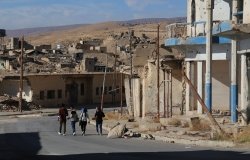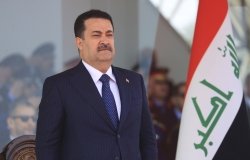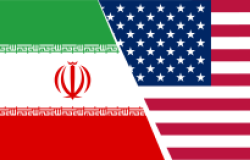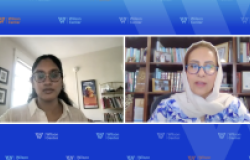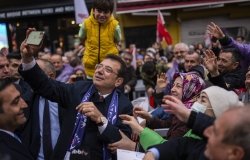Iran: The Week in Review
The Middle East Program offers the latest news on Iran, based on a selection of Iranian news sources. "Iran: The Week in Review" is a weekly summary of information with links to news in both English and Farsi. It includes the latest developments and analysis of news about the country. The Middle East Program will send "Iran: The Week in Review" every Thursday afternoon through the end of August.
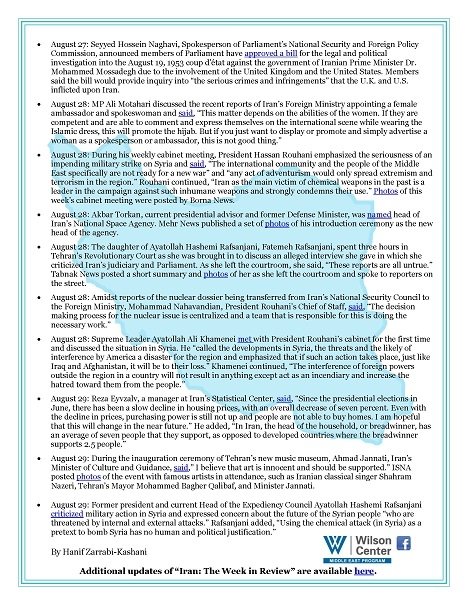
The Middle East Program offers the latest news on Iran, based on a selection of Iranian news sources. "Iran: The Week in Review" is a weekly summary of information with links to news in both English and Farsi. It includes the latest developments and analysis of news about the country. The Middle East Program will send "Iran: The Week in Review" every Thursday afternoon through the end of August.
Iran: The Week in Review
August 29, 2013
- August 23: Minister of Culture and Guidance Ali Jannati spoke about the ever-present “cultural invasion” of the West and said, “The invasion of culture is not a conspiracy theory, as it is our duty to prevent the spread of American culture in our country… but we have been afflicted with the politicization of arts and culture, and this has created problems and unrealistic expectations in our country.” Jannati continued, “Cultural managers in the past have been narrow-minded and are limited as administrators and managers. My goal is to bring in people who truly know and understand the field… I assure you that we will regain the trust of the people (in this field.)”
- August 23: ISNA posted a series of photos of President Hassan Rouhani as well as members of his cabinet and administration visiting the mausoleum of the late Ayatollah Khomeini. Ayatollah Khomeini’s grandson Hassan is also present during the symbolic ceremony.
- August 24: The current director of Iran’s atomic agency Ali Akbar Salehi declared that Reza Najafi will be appointed as Iran’s new envoy to the International Atomic Energy Agency (IAEA). Najafi will replace Ali Asghar Soltanieh who has served in the post since 2005 and resigned on August 22. Najafi is a highly regarded career diplomat. He has served as the director of foreign ministry’s disarmament office and is considered Iran’s top expert in non-proliferation issues. "Mr. Najafi has been active in the nuclear field for more than 20 years, and his name is well-known. He is a qualified choice for this position,” said Salehi in a written statement.
- August 24: During a celebratory ceremony for the new administration, Hassan Khomeini, the grandson of the late Ayatollah Khomeini warned, “The Islamic Republic has accumulated so many problems over the years that we cannot expect a short-term fix. I am hopeful that this new government will be able to solve these hard problems we face domestically and internationally.” Khomeini continued, “We are witnessing people expressing hope in their thoughts and actions, and the government cherishes and relies on this, and we carry the people’s hope that there will be a better tomorrow for our sacred country.”
- August 24: While discussing the economic situation of the country, President Hassan Rouhani explained, “With the country’s current condition of recession and inflation, in order to solve the complexities and economic problems of the country, we have a (economic) working group in place to identify many of the obstacles within 15 days and to review and list the options we have so that we can bring prosperity as soon as possible in the respective fields of employment, small and large business start-ups, industrial activity, agriculture, and public services.” The president added, “As I earlier promised to the people, in the first 100 days of my administration, or even sooner, we are taking immediate steps and actions to solve these economic problems, and we will keep the people informed of our work.”
- August 25: Although it is a crime for a Muslim to consume alcohol inside Iran, the first alcohol rehabilitation center received permission to operate in Tehran. Farid Barati-Sadeh, the Head of the State Welfare Organization’s Department for the Prevention and Treatment of Addiction, said, “The permit for this center, which will be opened in Tehran, has been issued for a pilot program. No other license will be issued until the conditions and outcomes of the activities of this center have been studied.” Barati-Sadeh said, “Alcoholics will be admitted to the center for periods of 25 days to one month,” and “the rehab center was to be opened in addition to Alcoholics Anonymous groups which have already received an official permit beforehand.”
- August 25: The Sultan of Oman Qaboos bin Said Al Said flew to Iran and officially became the first head of state to visit Iran under the Rouhani presidency. During their bilateral meeting, President Rouhani highlighted the important position of Oman in the region and stated, “both countries should further expand and deepen bilateral relations,” and called for more cooperation to restore regional peace. Sultan Qaboos also expressed readiness to increase trade ties with Iran through the North-South Corridor, which is currently being established by Iran, Turkmenistan, Uzbekistan, and Afghanistan. ISNA published a set of photos of the official welcoming ceremony of the Sultan of Oman Qaboos bin Said Al Said and President Rouhani at Saad Abad Palace in Tehran.
- August 25: Ali Kafashian, the head of Iran’s Soccer Federation, claims that the federation is facing financial difficulties and currently in debt. “Mr. Ahmadinejad promised that he would solve the problems that the federation currently faces, but he did not do so. We don’t expect miracles, but the government should pay attention to soccer,” said Kafashian. In an interview with Mehr News, Kafashian pointed to the recent cancelation of Iran’s national soccer team training camp, which was to be held in Portugal to prepare for the 2014 World Cup which Iran qualified for. Kafashian added, “We did our best to provide the cost of the trip, but I cannot pay the extra expenses of the trip. We at the Soccer Federation have done all we can to resolve these financial problems, but no one will help us. With these financial conditions, we can’t hold a proper training camp.” When asked whether he is hopeful about President Rouhani’s new Youth and Sports Minister, Kafashian answered, “We don’t have any expectations. The previous government under Ahmadinejad promised to solve the problems as well but nothing happened.”
- August 26: The parliamentary Health Commission Subcommittee approved a law that reduces the working hours for employed women with children under seven years of age, those with an incurable disease, or those with a disability. The mandatory 44 hours per week would be reduced to 36 hours per week.
- August 26: The Supreme Leader of Iran Ayatollah Ali Khamenei met with the Sultan of Oman Qaboos bin Said Al Said and other high level officials of each government to discuss bilateral trade relations in the gas sector as well as regional developments. During the meeting Sultan Qaboos said, “Oman and the Islamic Republic were good neighbors.” Ayatollah Khameini remarked, “The reason for the critical situation in the region is because of several instances of foreign interference from outside the region.” Sultan Qaboos also stated, “The corrupt Zionist regime is a permanent threat to the region and is fully supported by the United States. They are the most serious threat to the region as they have the most dangerous stockpiles of weapons of mass destruction.” ISNA posted a series of photos of the meeting between the Sultan of Oman, the Supreme Leader, President Rouhani, and other officials from Oman.
- August 26: Opposition cleric Grand Ayatollah Sayyid Ali Mohammad Dastgheib has, for the second time in recent months, publicly stated his support for Mir Hossein Mousavi, his wife Zahra Rahnavard, and Mehdi Karroubi. Dastgheib said, “As I said before, I still believe there is someone (who is respected) who can use their words to mediate in order to express that they need to be free. The political prisoners, Mr. Mousavi and his wife Ms. Rahnavard, and Mr. Karroubi were all friends of Imam Khomeini!”
- August 26: Former U.S. Assistant Secretary of State and current United Nations Undersecretary General for Political Affairs, Jeffrey Feltman, arrived in Iran to hold talks with Foreign Minister Mohammad Javad Zarif and Hossein Amir Abdollahian, his deputy for Arab and African Affairs, to discuss regional developments pertaining to Syria, Egypt, and Lebanon. Feltman served as U.S. Assistant Secretary of State for Near Eastern Affairs from August 2009 to June 2012 before joining the United Nations. ISNA published a set of photos of the meeting.
- August 27: Seyed Ramezan Shojaei Kiasari, member of Parliament and council member on the Commission of Internal Affairs, discussed the possibility of Mohammed Bagher Qalibaf, former presidential candidate and current mayor of Tehran, extending his current position as mayor of Tehran for a third term. Kiasari said, “There is no law that allows Mr. Qalibaf to remain mayor of Tehran so we are currently reviewing the possibilities to see if him staying (as mayor) will be positive for the mayor’s office.” Kiasari added, “The city council will continue to discuss this possibility with the Parliament and the administration.”
- August 27: President Hassan Rouhani spoke at the National Explanation of Moderation Conference and discussed his own beliefs about his approach to moderation and said, “Moderation is the phrase that I have offered to my countrymen, so that my countrymen understand the necessity to start the new path and become hopeful in their hearts. It is my opinion that moderation is a realistic ideal and can serve as a vehicle for better living conditions for Iranians.” Borna News provided photos of the event.
- August 27: Dr. Seyed Hamed Barkati, the Head of the Department of Child Health in the Health Ministry, said they have requested to send the “Promotion of Breastfeeding” bill to Parliament. The new amendment to the law will include up to nine months of maternity leave for new mothers and 15 days of leave for the father. It is intended to promote breast feeding and child rearing among mothers.
- August 27: Seyyed Hossein Naghavi, Spokesperson of Parliament’s National Security and Foreign Policy Commission, announced members of Parliament have approved a bill for the legal and political investigation into the August 19, 1953 coup d’état against the government of Iranian Prime Minister Dr. Mohammed Mossadegh due to the involvement of the United Kingdom and the United States. Members said the bill would provide inquiry into “the serious crimes and infringements” that the U.K. and U.S. inflicted upon Iran.
- August 28: MP Ali Motahari discussed the recent reports of Iran’s Foreign Ministry appointing a female ambassador and spokeswoman and said, “This matter depends on the abilities of the women. If they are competent and are able to comment and express themselves on the international scene while wearing the Islamic dress, this will promote the hijab. But if you just want to display or promote and simply advertise a woman as a spokesperson or ambassador, this is not good thing.”
- August 28: During his weekly cabinet meeting, President Hassan Rouhani emphasized the seriousness of an impending military strike on Syria and said, “The international community and the people of the Middle East specifically are not ready for a new war” and “any act of adventurism would only spread extremism and terrorism in the region.” Rouhani continued, “Iran as the main victim of chemical weapons in the past is a leader in the campaign against such inhumane weapons and strongly condemns their use.” Photos of this week’s cabinet meeting were posted by Borna News.
- August 28: Akbar Torkan, current presidential advisor and former Defense Minister, was named head of Iran’s National Space Agency. Mehr News published a set of photos of his introduction ceremony as the new head of the agency.
- August 28: The daughter of Ayatollah Hashemi Rafsanjani, Fatemeh Rafsanjani, spent three hours in Tehran’s Revolutionary Court as she was brought in to discuss an alleged interview she gave in which she criticized Iran’s judiciary and Parliament. As she left the courtroom, she said, “These reports are all untrue.” Tabnak News posted a short summary and photos of her as she left the courtroom and spoke to reporters on the street.
- August 28: Amidst reports of the nuclear dossier being transferred from Iran’s National Security Council to the Foreign Ministry, Mohammad Nahavandian, President Rouhani’s Chief of Staff, said, “The decision making process for the nuclear issue is centralized and a team that is responsible for this is doing the necessary work.”
- August 28: Supreme Leader Ayatollah Ali Khamenei met with President Rouhani’s cabinet for the first time and discussed the situation in Syria. He “called the developments in Syria, the threats and the likely of interference by America a disaster for the region and emphasized that if such an action takes place, just like Iraq and Afghanistan, it will be to their loss.” Khamenei continued, “The interference of foreign powers outside the region in a country will not result in anything except act as an incendiary and increase the hatred toward them from the people.”
- August 29: Reza Eyvzalv, a manager at Iran’s Statistical Center, said, “Since the presidential elections in June, there has been a slow decline in housing prices, with an overall decrease of seven percent. Even with the decline in prices, purchasing power is still not up and people are not able to buy homes. I am hopeful that this will change in the near future.” He added, “In Iran, the head of the household, or breadwinner, has an average of seven people that they support, as opposed to developed countries where the breadwinner supports 2.5 people.”
- August 29: During the inauguration ceremony of Tehran’s new music museum, Ahmad Jannati, Iran’s Minister of Culture and Guidance, said,” I believe that art is innocent and should be supported.” ISNA posted photos of the event with famous artists in attendance, such as Iranian classical singer Shahram Nazeri, Tehran’s Mayor Mohammed Bagher Qalibaf, and Minister Jannati.
- August 29: Former president and current Head of the Expediency Council Ayatollah Hashemi Rafsanjani criticized military action in Syria and expressed concern about the future of the Syrian people “who are threatened by internal and external attacks.” Rafsanjani added, “Using the chemical attack (in Syria) as a pretext to bomb Syria has no human and political justification.”
Documents & Downloads
Related Program

Middle East Program
The Wilson Center’s Middle East Program serves as a crucial resource for the policymaking community and beyond, providing analyses and research that helps inform US foreign policymaking, stimulates public debate, and expands knowledge about issues in the wider Middle East and North Africa (MENA) region. Read more






